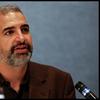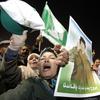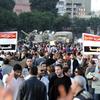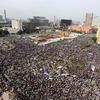David D. Kirkpatrick appears in the following:
Update from Tripoli
Friday, April 01, 2011
The New York Times' David Kirkpatrick is in Tripoli. He reports on the latest following several high profile defections by Libya's officials.
As Libya's Foreign Minister Defects, New Questions Arise About Lockerbie Bombing
Thursday, March 31, 2011
The New York Times correspondent, David Kirkpatrick is in Tripoli where government officials have continued to maintain that Col. Gadhafi and his family will stay in the country to the end. This comes as Libya's foreign minister, Moussa Koussa defected to the U.K. He was known as the "envoy of death," says David Kirkpatrick as he was accused of killing Libyan defectors abroad. He has also been charged with being responsible for the Lockerbie bombing. Susan Cohen is the mother of Theodora Cohen who was aboard Pan Am's flight 103. She also co-authored "Pan Am 103: The Bombing, the Betrayals, and a Bereaved Family's Search for Justice." She responds to the news that Moussa Koussa has left Libya.
Libya: Who is Iman Al Obeidi?
Monday, March 28, 2011
When a Libyan woman burst into the Tripoli hotel where foreign journalists convened, her story of rape at the hands of Gadhafi's militia men was heard around the world. Correspondent for The New York Times David Kirkpatrick was there. Her story is that she was abducted and tortured, but government officials are saying that she’s a prostitute with a long criminal record. She was beaten and dragged away by security officials. David Kirkpatrick says that Libyan officials had said that reporters would be able to talk to her again, but that this is unlikely.
Update from Tripoli
Thursday, March 24, 2011
The New York Times' David Kirkpatrick reports from Tripoli. He says that it seems that on the ground, Gadhafi's forces have had no problems moving through the country. He reports that the Gadhafi regime has been handing out Kalashnikovs to households in the nations.
Updates from Libya as Gadhafi Targets Zintan
Wednesday, March 23, 2011
Coalition aircraft launched two new strikes on Moammar Gadhafi's forces in the city of Misurata Wednesday morning. It was believed that the strikes had halted new attacks by Gadhafi's forces, but new reports say that Gadhafi's brigades have shifted their assault to the city of Zintan. The city has been under siege for weeks. There's no water, fuel or electricity and the hospital is said to be overflowing with civilian casualties. Mohammad Ali is one of 15 people on the local council in Misurata. He says he is grateful for coalition intervention. The New York Times' David Kirkpatrick reports from Bani-Walid, where, he says, everyone is armed.
On Reporting from Tripoli
Tuesday, March 22, 2011
The New York Times' David Kirkpatrick has been in Tripoli reporting on the situation in Libya. He is in the country with the permission of the Gadhafi regime and is only allowed to leave his hotel when his minders take him and other journalists outside. He talks about the latest developments in Libya and what it's like to report on the situation with a minder at his back.
Day 4: Coalition-Led Intervention in Libya
Tuesday, March 22, 2011
It’s the fourth day of allied attacks against Colonel Moammar Gaddahfi’s loyalist forces in Libya. Correspondent for The New York Times, David Kirkpatrick reports from Tripoli on the rebel fighters and their intended goal. While the rebels fight on, the question remains as to what the future leadership might look like, and whether the country is experiencing a civil war. Is it a fight for democracy or just one side against the other?
Libya: New York Times Journalists Released
Monday, March 21, 2011
The four journalists who were missing in Libya have been released and are on their way out of the country. Meanwhile, the air assault against Col. Gadhafi's forces continues in the country. Correspondent for The New York Times' David Kirkpatrick reports from Tripoli. He says the air strikes happen overnight. However, will the no-fly zone be enough to topple Gadhafi? It seems, says Kirkpatrick, that the hope is that with air support from the allies', the rebels will have enough moral support to keep up the fight on the ground.
Libya Responds to UN Vote on No-Fly Zone
Friday, March 18, 2011
Correspondent for The New York Times, David Kirkpatrick reports from Tripoli on how the Libyan government is responding to news that the UN has voted to enforce a no-fly zone above Libya. At first, the government is saying that Tripoli will become like Iraq, and that the West wants to take control of the country's oil. However, Libyan's government has announced that it will abide by a cease fire following the UN vote to enforce a no-fly zone.
Top of the Hour: Congressional Hearings on the 'Radicalization of Muslims', Morning Headlines
Wednesday, March 09, 2011
Libya has seen continued violence as the international community considers how to respond. The New York Times' David Kirkpatrick reports from Tripoli.
Here in the U.S., Congress will hold hearings on the radicalization of American Muslims on Thursday. Takeaway listener, Steve called from Denver to say: “If Peter King is going to investigate home grown terror. What about the groups in America and that led to Timothy McVeigh bombing Oklahoma City or the guy that flew his single airplane into the ATF building. And other home grown radical groups, and are they up for investigation too?”
Top of the Hour: Heavy Fighting in Libya, Morning Headlines
Wednesday, March 09, 2011
The New York Times David Kirkpatrick reports from Tripoli where he has been holed up in a hotel waiting for Col. Gadhafi, who said he was going to meet with reporters: Gadhafi has yet to show up. Meanwhile, Libyans are waiting to see if there will be international intervention in their country.
Top of the Hour: Update from Tripoli, Morning Headlines
Monday, March 07, 2011
Gas prices are averaging $3.50 a gallon, which is almost 40 cents higher than last month's prices. This rise is being driven by the unrest in the Mideast and the oil rich country of Libya.
Correspondent for The New York Times, David Kirkpatrick reports from Tripoli on the continued fighting in Libya.
Report from Tripoli
Tuesday, March 01, 2011
Moammar Gadhafi, speaking to the press, said of his people, "They love me, all my people are with me. They love me all. They will die to protect me, my people." U.S. ambassador to the United Nations, Susan Rice responded by saying the ruler is delusional. As fierce fighting continues in Libya, the question remains: Can Gadhafi be overthrown? Correspondent for The New York Times, David Kirkpatrick reports from Tripoli.
Gadhafi Links Libyan Protests to bin Laden and Drugs
Friday, February 25, 2011
In a second address that displayed he was digging into his position yesterday, Libyan leader Moammar Gadhafi blamed the recent bloody protests in his country on the effect of hallucinogenic drugs distributed by al-Qaida leader Osama bin Laden. On Libyan State Television, the 68-year-old leader said of the protesters: “once they drink these pills, they let them go out on the streets and start committing criminal acts. The requests are not theirs — the requests come from Bin Laden." Also on Thursday, Gadhafi's youngest son joined the pro-democracy movement, while his cousin — and close aide — defected to Egypt. Are these signs that the autocratic leader is losing grip on his nearly 42 years of power?
Update: Battle for Tripoli
Thursday, February 24, 2011
The New York Times' David Kirkpatrick is on the Libyan border. He reports that Libyans are preparing to fight for Tripoli as areas nearby appear to be in the opposition's control. The question of whether Col. Gadhafi will leave Libya has yet to be answered.
Update From the Libyan Border
Wednesday, February 23, 2011
David Kirkpatrick is near the Libyan border reporting for The New York Times. He says that those coming across the border say that there's fighting in the northwest, and that the situation is violent and dire inside the country. At the same time, he says, Libyans are ready to live in a country free from the dictatorship of Col. Gadhafi.
Top of the Hour: UN Meets on Libya, Morning Headlines
Tuesday, February 22, 2011
As Gadhafi continues to use violence against his own people, the U.N. meets to discuss how to respond. Libya's own deputy U.N. ambassador has said, "what's going on in Libya is a real genocide against the Libyan people. Gadhafi is shooting his own people." David Kirkpatrick, reporter for The New York Times says that the eastern side of the country has fallen to anti-Gadhafi groups. But at the same time, there are reports of continued violence against anti-government forces and protesters.
Updates from Bahrain and Libya
Monday, February 21, 2011
Protests continued to rage across the Middle East throughout the weekend. While the Bahraini government withdrew its military from the capital and allowed peaceful demonstrations, Libyan security forces continued to fire on protestors in Benghazi and Tripoli. Human Rights Watch estimates that the Libyan government has killed at least 223 protesters since political unrest began six days ago. But in a nationally-televised address, the son of Libyan ruler Col. Moammar Gadhafi, Seif al-Islam al-Gadhafi, claimed that the death toll was greatly exaggerated and that Libya was on the brink of civil war. Will Gadhafi hold onto power? What's next for Bahrain? And how will the Obama Administration respond?
Mubarak Regime Clings to Power
Tuesday, February 01, 2011
As thousands continue to protest in Egypt, President Mubarak's days in power may be coming to an end. The question of how long Mubarak can survive given the economics in the country. Gas is running out, supplies are not coming in, unemployment is high. Samer Sheheta, professor of Arab politics at the Center for Contemporary Arab Studies at Georgetown University weighs in. With one million protesters openly demonstrating against the government, how much longer can the Mubarak regime hold power?
Jubilation as Crowds Converge in Cairo's Tahrir Square
Tuesday, February 01, 2011
David Kirkpatrick, reporter for The New York Times has an update from Tahrir Square in Cairo, where thousands are gathering in preparation for a march to call for the resignation of President Mubarak. He describes a crowd that is jubliant and peaceful, saying that protesters have brought their families and children to the Square as the fear has dissipated.





